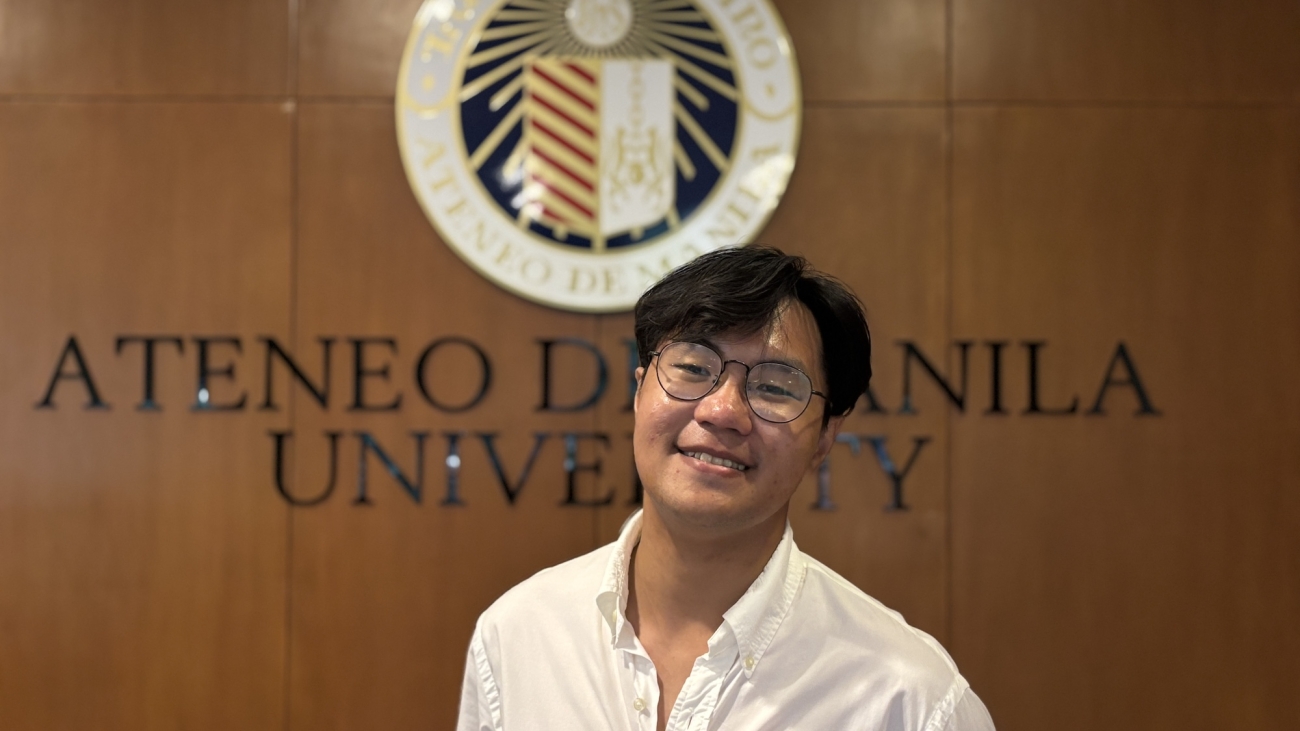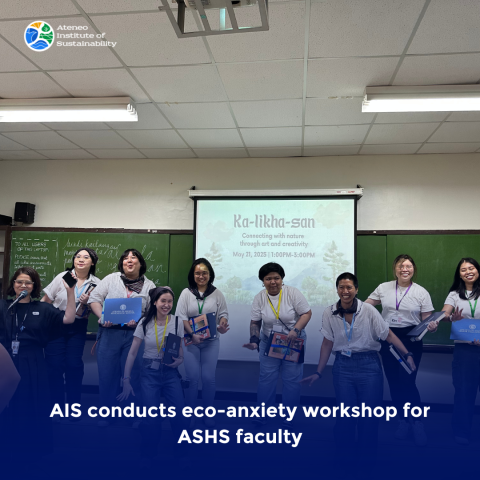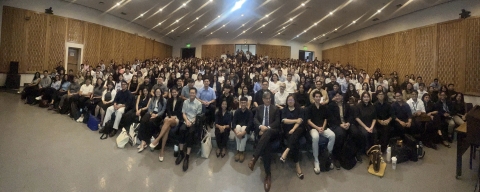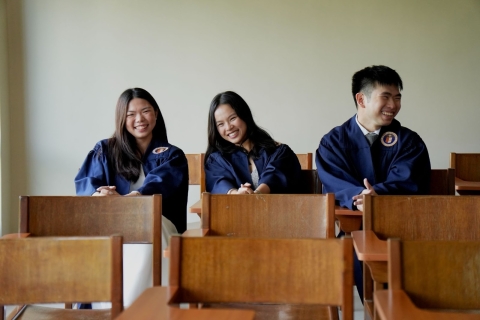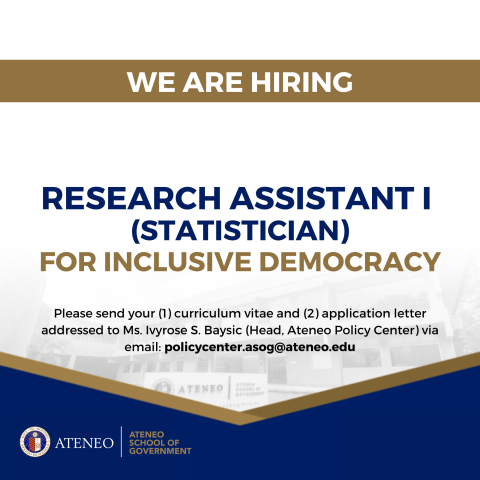Choosing to thrive: Tobi Leung and his Ateneo journey
28 May 2025 | KD Suarez
Coming to Ateneo in the midst of the COVID-19 pandemic in 2021, Robert Nelson "Tobi" Leung (BS Applied Mathematics, summa cum laude), College Class of 2025 valedictorian, felt that he had to pare down his life and focus solely on studying.
With the uncertainties brought by the pandemic, Tobi thought he wouldn’t be able to pursue his passions outside academics — in particular, debate.
“We didn’t know when we’d go back on-site; we didn’t know what activities would be around,” he recalls. “We didn’t know what orgs would be around, what opportunities would be available for us. I kept thinking to myself, maybe I need to make sacrifices, you know?”
Tobi grew up in Baguio City and graduated from the Philippine Science High School – Cordillera Administrative Region (CAR) Campus. He entered Ateneo as a San Ignacio de Loyola Merit Scholar, a scholarship granted to graduates of public or state-supported schools. As a scholar (and a science scholar at that), he felt there was an expectation to focus on studying — and not do anything else. “You get told that when you enter college, you have to focus on your acads. You have to go down the straight path: study, study, study,” he says.
Instead, Tobi chose to thrive in college — and thrive he did.
Beyond numbers
In terms of academics, Tobi explored beyond what we usually think of as the domain of mathematicians. As an Applied Math major, he took advantage of Ateneo's interdisciplinary academic culture and worked with people outside the School of Science and Engineering. This led him and his coursemates Aldie Alejandro and Rafael Acuña to work on an undergraduate thesis on political dynasties.
Working with his home department and the Ateneo School of Government, the trio — under the guidance of Dr Clark Go, Dr Job Nable, and Dr Jude Buot — applied techniques and concepts from graph theory and network analysis to examine Filipino political dynasties.
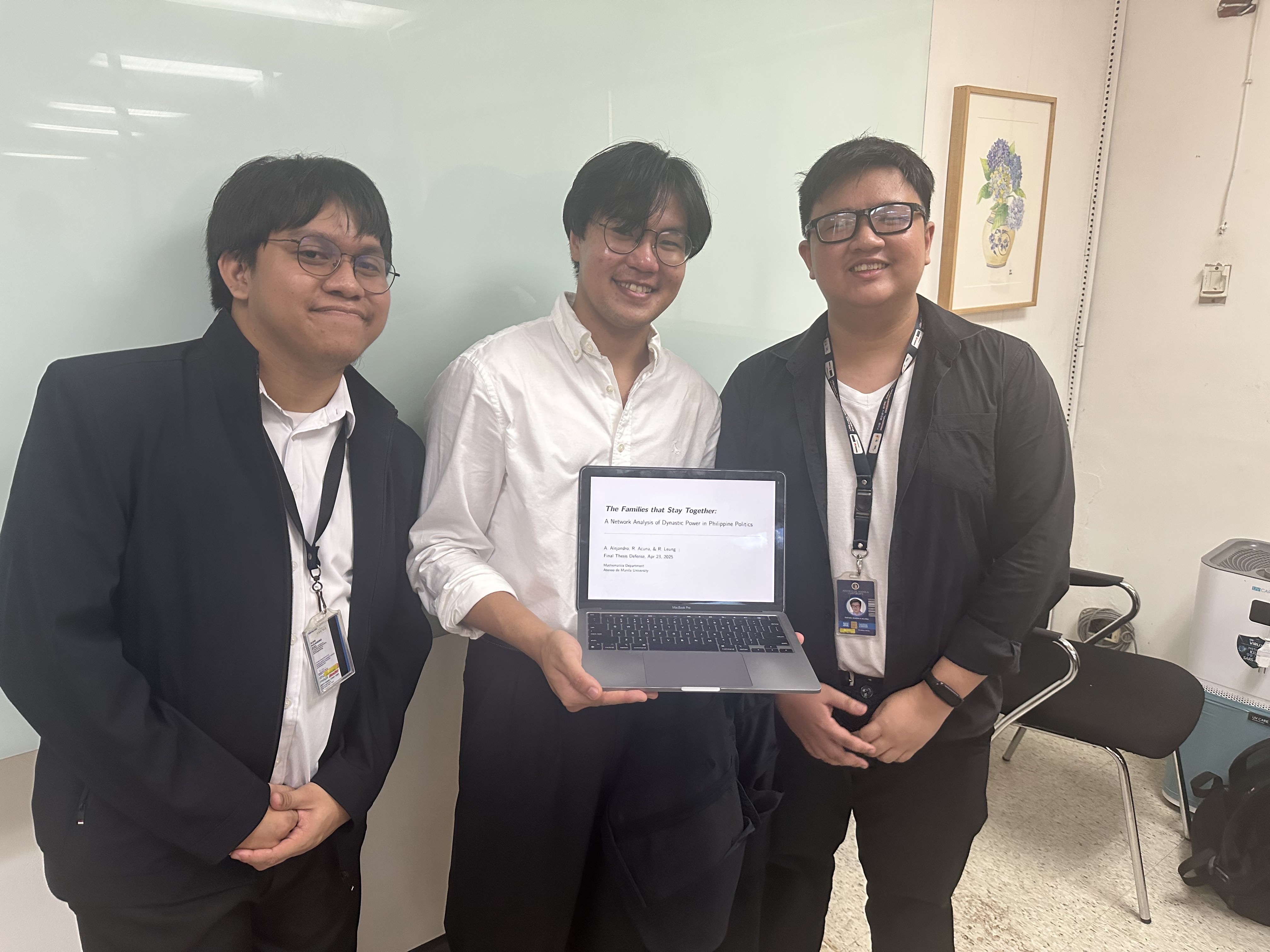
“So we asked about how dynasties have evolved, how they’re structured — because we know dynasties are a problem. But from an empirical standpoint, we know very little about them,” he explains.
Their study found that not only have political dynasties been growing, they have also been becoming more interconnected. They discovered that, in some ways, these dynasties function as substitutes for political parties, a possible sign of the weakness of our political party system. Finally, they found that certain types of dynasties have an impact on Human Development Index (HDI) outcomes in certain communities.
“One of the beautiful things about my course is that it teaches you to recognize patterns in the way the world works. So I think coming in with that mindset, you aren’t intimidated by the field you’re applying it to,” he explains.
Thriving
Aside from excelling in his schoolwork, he also grew outside the classroom, and in particular on the debate stage. He joined several student organizations, including the Ateneo Mathematics Society, Gabay, and the Ateneo Debate Society (ADS). He became an active member of ADS, which eventually led to him finding himself in Madrid, Spain at the age of 19, on collegiate debate’s biggest stage: the 2023 World Universities Debate Championships.
With his teammate David Africa (BS Applied Math ’23), Tobi won the 2023 WUDC championship, besting teams from storied institutions such as Harvard, Princeton, and the National University of Singapore. To top it all off, he was named the second-best speaker in the tournament — second best in the world.
It was a historic moment for Philippine collegiate debate — after all, it was the first time a Filipino team emerged champion in the Worlds. But for Tobi, it was a moment of peace.
“I remember when they called us to the stage. At that moment, I didn’t really feel anything,” he recalls. “I was expecting to feel so much joy, so much relief. But the only thing that struck me was this overwhelming sense of peace, of tranquility. I didn’t feel sad. I didn’t feel happy. I didn’t feel anxious. All of it kind of just went away.”
Overcoming self-doubt
This moment, Tobi says, was his most memorable college moment because it was the moment he felt sure of who he was and who he wanted to be, after years of self-doubt. “Those are so rare — the moments where you can just look back at... all the things you’ve sacrificed and say it was all worth it.”
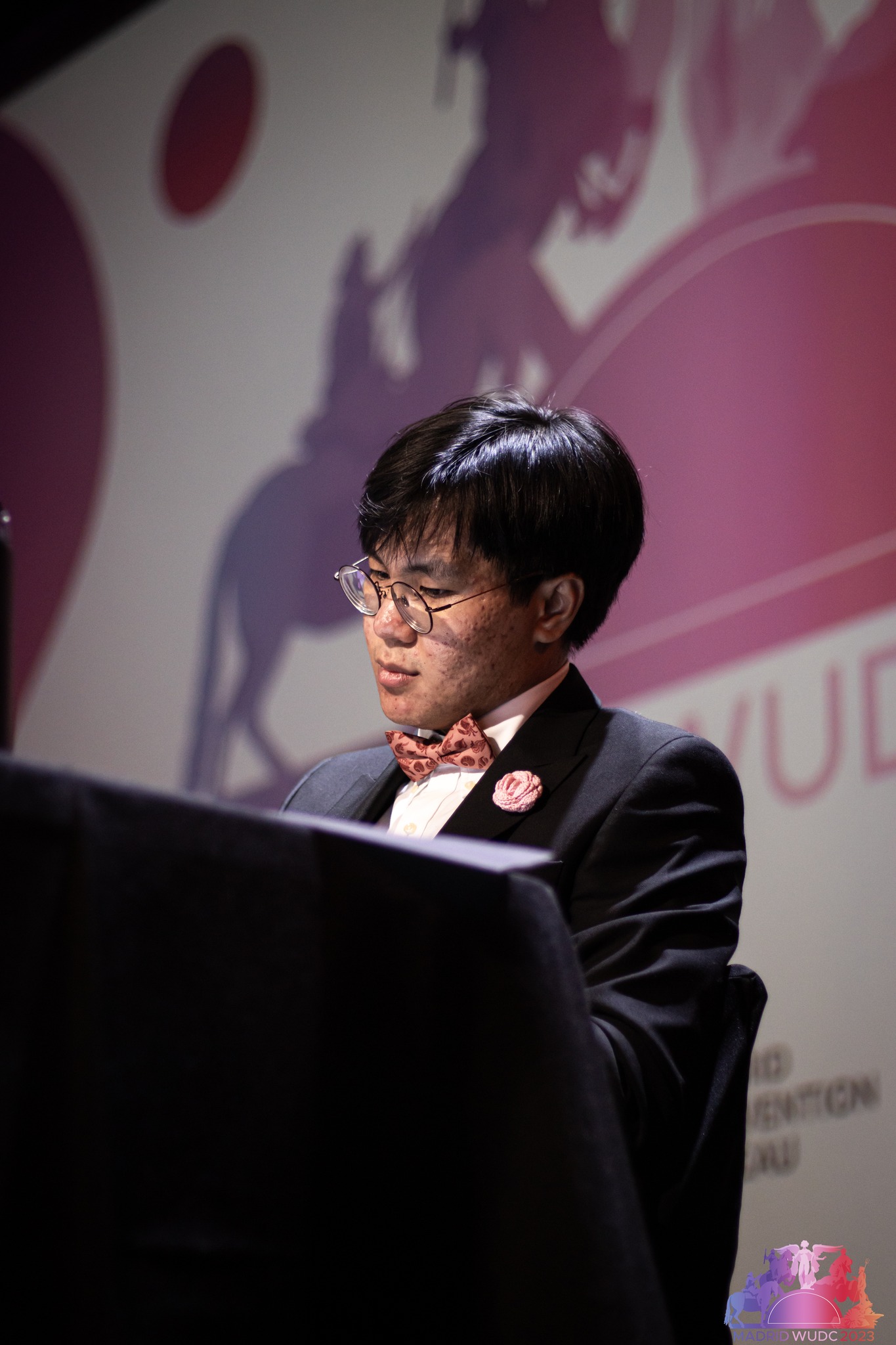
“So many times at the start of college, I was thinking of quitting debate and focusing on my academics. I was even thinking of transferring out of Ateneo, going somewhere else, finding opportunities abroad — you know, typical things Pisay kids are told to do,” he says. “But each time I was like, no, I have to stay here because I feel like I can do something. I feel like I can do what no one else has done. And it wasn’t easy. I had to put my money where my mouth is. I had to do what no one else had done. But to this day, that’s one of the moments I point to in my life where I just say — we did it.”
"What I always say is that what I've learned in Ateneo is that we are all the lies we tell ourselves," he says. "So much of life, so much of society, so much of the world is built on shared narratives, so shared fictions, right? There is nothing there that's real. It's because we believe in it that it becomes real."
"I never thought of myself as a world champion debater. I never thought of myself as a brilliant mathematician. I still don't think I am. But in the moments where it counted, where I needed to show up to give the best speech of my life, where I needed to ace the exam, to study as hard as I could, I would just tell myself: This is who I am. I am who I say I am, and I will be who I say I am," he says.
"I think overcoming – it not per se overcoming the self-doubt because it's always there; you'll always doubt yourself even in the moment. But learning to set aside the doubt and say who I think I am doesn't matter; it's who I believe I am that does."
A win not just for himself
The honor of being named valedictorian, he says, is not really for him but for the people who helped him get to where he is now.
“I think I’m happiest for the people who supported me: the math department, my thesis mates, my family, my orgmates — because more than a win for me, I think this is really a win for them,” he says.
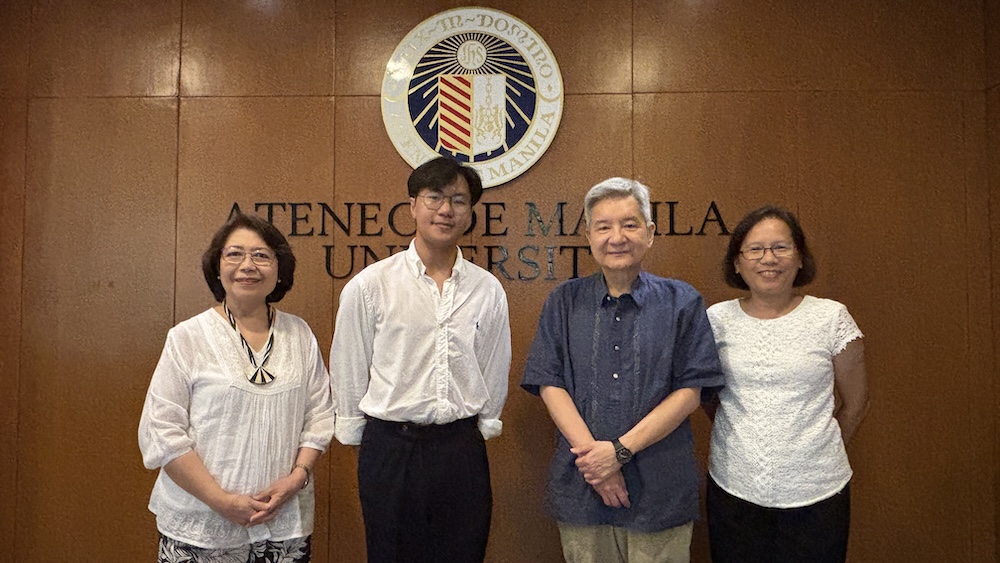
Ateneo, he says, is a very unique community. “We joke that Ateneans are stuck-up, they’re snarky, they’re elitist. But from my experience, at least in my corner of the university, the people are so warm, so welcoming, and so genuine.”
“I’ve seen university cultures around the world, and there’s really no place like Ateneo: where when you struggle, you struggle together. When there’s a problem you can’t solve, you solve it together. When you're lost, you're confused, you're sad, all you have to do is step into the org room and someone will be there, someone will comfort you,” he says.
“Part of it maybe is the Filipino culture; we’re social creatures. We’re societies of reciprocity. But part of it also, I think, is the culture that Ateneo has fostered,” he continues. “Being men and women for others means being men and women for each other, and we sometimes forget how much that helps us grow and how much that helps us learn.”
After college, Tobi plans to pursue further studies. He has set his sights on the Econometrics and Mathematical Economics master’s program at the London School of Economics.
“A little bit of economics, a little bit of math — so staying close to my Applied Math roots, but with a policy focus,” he says. “My ultimate goal is to come back, to serve in some capacity — whether in research and public policy, even in industry.”
An unconventional life
What does being valedictorian mean to Tobi?
“‘Ateneo Valedictorian’ is a very special distinction. We don’t just base it on grades. It’s not a one-dimensional thing,” he says. “We pride ourselves as a university on having a holistic assessment of who should be valedictorian. We have a very long and complicated process for it. Sabi ko nga sa interview, talo pa natin ang conclave.”
This honor, Tobi says, is “an affirmation of the unconventional life” he has chosen to live: as a scholar, a mathematician, a debater.
“As a kid, I had so much self-doubt — even coming into Ateneo. I’m a debater. I like writing speeches. I’m a performer. But at the same time, I’m a mathematician. I’m a science kid. I’m a nerdy kid. And for a while… I felt so much conflict because I’m like, ‘how can a person be more than what you expect of them?’
“What this means to me, really, is it’s a celebration of the more unconventional paths in life — which I think is really the strength of our university,” he says. “We celebrate interdisciplinary people, people who go out of their comfort zone, and people who excel in that lifestyle. I’m very happy I got this far,” he says.


